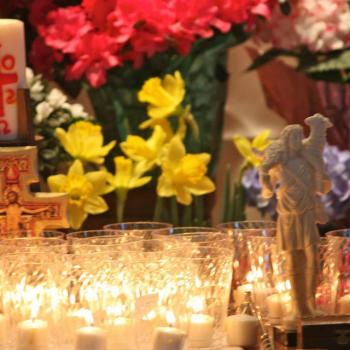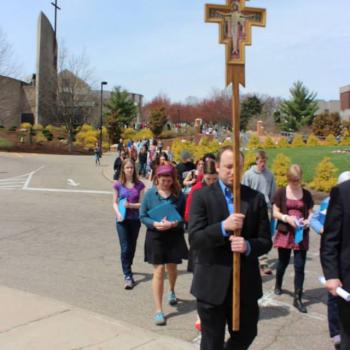
“About Jesus and the Church, I simply know they’re just one thing, and we shouldn’t complicate the matter.”
~ St. Joan of Arc from the transcripts of her trial.
Christ so identifies himself with his people, the Church, that when he confronts Paul on the road to Damascus, he asks, “Why are you persecuting me?” Many passages in St. Paul’s letters help to develop the implications of this radical incarnation of Christ present in the flesh and faces of his new Mystical Body: “For we are members of his body, of his flesh, and of his bones” (Ephesians 5:30) and “Now you are the body of Christ and individually members of it” (1 Corinthians 12:27).
In 1 Corinthians 13, Paul reminds us of the three essentials we require in order to remain in Christ’s body (see John 15): faith, hope, and love; then he launches into some of the most beautiful poetry in the Bible, the Canticle of Love. This supernatural Love provides the “glue” that gives Christ’s new body life, integrity, and unity.
Christ also left us a method, or a structuring principle, in the (messy, impulsive, and even sinful) person of Peter, who embodies Christ, specifically his divine authority to teach and to minister the Eucharist and other sacraments, “vicariously.” Peter, the apostles, and later the bishops all ensure that these two key divine functions remain present in our own flesh.
A body part cannot be “fired” or “voted out of office.” Only by incurring great pain and permanent loss of function could a body sustain the loss of a limb. But a body cannot survive the loss of its central nervous system or heart, and neither can Christ’s body on earth sustain the loss of its embodied teaching authority or the lifeblood of the sacraments. While the brain and heart can sustain the loss of a hand, a hand dies if it loses contact with its brain or heart.
The extent to which it makes us uncomfortable to think about interpersonal relationships in such visceral terms can give us insights into how distant we are from faith, which does not involve assent to abstract principles but rather demands we enter into relationship with the divine through tangible, concrete matter.
One can disagree with the bishops (and even the Pope!) without damaging the loving unity upon which Christ’s current incarnation depends. But a baptized person who disavows or attacks the person of a bishop either engages in self-mutilation and a hatred for Christ or betrays a depth of ignorance that points to a severe crisis in education (it works the other way around, too: bishops who do violence to the baptized injure the person of Jesus and commit a form of suicide by dismemberment).














